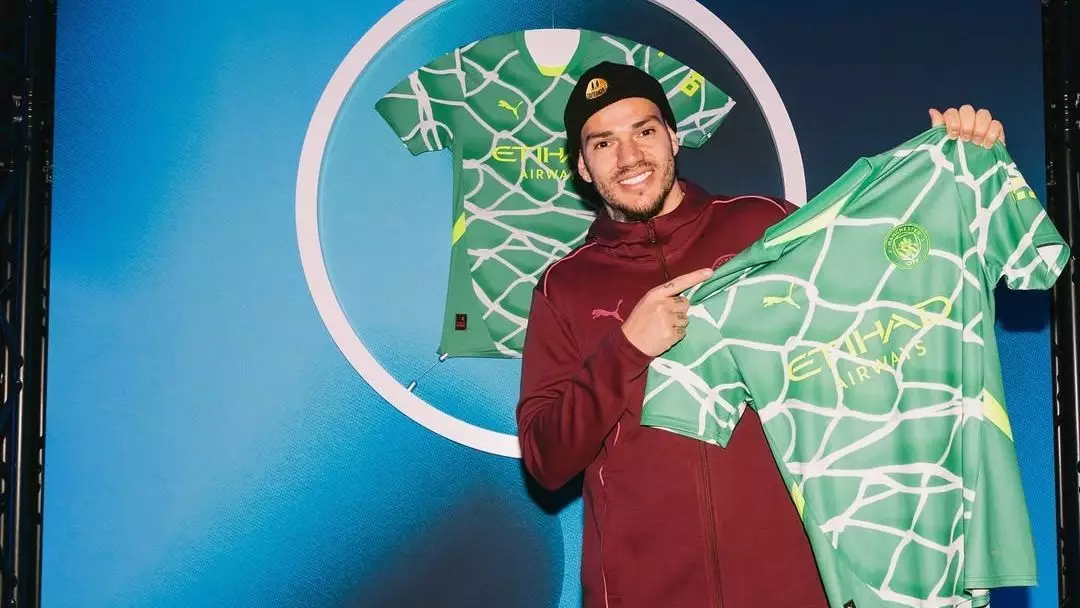The landscape of sports merchandising is undergoing a significant transformation, particularly for clubs like Manchester City which now finds itself grappling with a forgettable streak of draws and losses unseen during the Pep Guardiola tenure. To counterbalance this wave of disappointment for its supporters, City, in collaboration with Puma, has rolled out a novel initiative this festive season: a text-to-image AI kit generator. This effort invites fans to participate in an interactive contest aimed at designing the club’s third kit for the 2026-27 season.
While the concept may raise eyebrows, arguably suggesting that Puma and Manchester City are offloading design responsibilities onto the fans while tapping into burgeoning AI technology, the potential for creativity is undeniably intriguing. Players such as Éderson, Stefan Ortega, and Rico Lewis have already tested their hands at this AI tool, illustrating that even with some unconventional results, imagination can sometimes yield amusing outcomes.
At the core of this initiative lies a partnership with DeepObjects, which promotes itself as pioneering a decentralized design studio model. However, this raises pressing questions regarding the ethical implications surrounding AI-generated artworks. Many are aware of the controversies surrounding AI image generation, particularly concerning the extensive libraries these algorithms draw from to “learn” and the potential for unintentional plagiarism. While explicit details on how DeepObjects and Puma configured the AI to generate apparel designs remain scarce, users must consent to a set agreement that permits both Manchester City and Puma to tweak their generated creations. This is presumably to ensure copyright integrity and that produced designs adhere to club branding, maintaining visibility for sponsors and badges.
The generator itself, while multifaceted, doesn’t always deliver expected results when users request specific designs. For instance, prompts intended to yield stylish kits inspired by iconic pop culture references, such as ‘Morning Glory’ era Gallagher, produced mismatched outputs, underscoring the limitations and quirks of AI understanding. Users might find it challenging to achieve their creative visions without experiencing some humorous misfires.
The process for fans wishing to showcase their artistic skills is straightforward but multi-layered. After signing up for the AI kit creator, participants receive an initial allowance of 15 Design Credits. Design entries consume one credit each, which encourages users to engage with other submissions to earn additional credits. This participatory approach not only enables creativity but also fosters a sense of community among City fans.
As users input prompts, they can generate up to four variations, which amounts to a plethora of potential designs. However, the rules dictate that each participant can only submit two official entries into the competition—an aspect that some may find limiting, although options for additional entries exist through community engagement.
When the submission window closes on December 20, a selective panel comprising both fan reviews and experts from Manchester City and Puma will assess the inputs. They’ll compile a shortlist of ten standout designs, which will then be put to public voting in January 2025. The winning design will eventually be transformed into a real-life kit to be paraded on the pitch during the 2026-27 season.
Ivan Dashkov, Puma’s Head of Emerging Marketing Tech, heralds this initiative as a means to bridge the gap between innovative technology and fan engagement. While many supporters would welcome the novelty of contributing to the club’s merchandise, there remains a layer of skepticism. Fans are not just looking for technological ingenuity but also for a design aesthetic that resonates with the club’s rich history and identity.
In essence, while some fans may revel in the opportunity to design a kit, others may prioritize traditional elements over avant-garde innovations coupled with AI’s unpredictability. The fear is that reliance on technology could overshadow the classic appeal of football kits that fans have cherished over generations.
Ultimately, Manchester City’s AI kit design contest is an ambitious attempt to intertwine modern technology with vibrant fan culture. It invites supporters to become creators—offering them a canvas to express their sentiments about the club amid tumultuous times. As the competition unfolds, it will be intriguing to see how creativity fares in a digital realm governed by algorithms, and whether the end product can echo the legacy and fervor of Manchester City. Supporters, while dealing with the challenges on the pitch, may just find a new way to channel their creativity and passion off of it.

